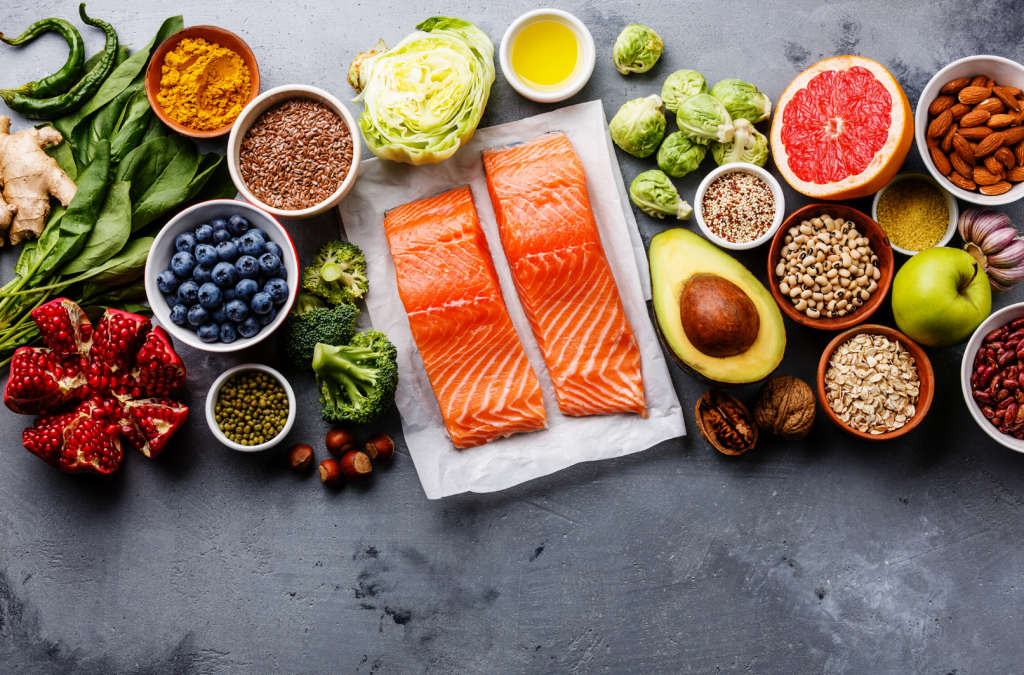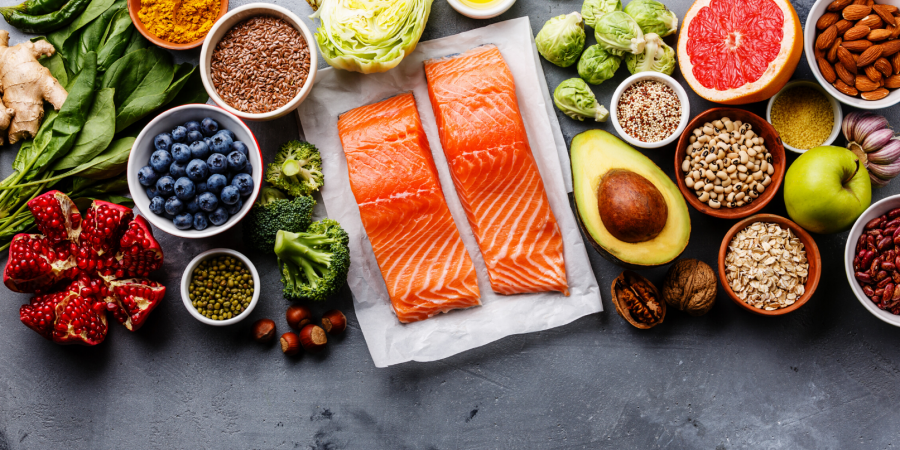Your gut health greatly impacts the rest of your body and an imbalanced gut can be damaging to your physical and mental health. The good news is that you can implement many dietary and lifestyle changes to promote the healthy bacteria in your gut.
Diet
Try to make the bulk of your diet whole foods, with nourishing fruits, vegetables, fiber, protein, and healthy fats.
Switch up your meal plans to get a diverse range of good bacteria to feed your gut. There are many resources online for quick, easy, healthy meals. Try these probiotic power bowls, packed with gut-friendly foods like apple cider vinegar, ginger, cauliflower, and dandelion. In addition, here are 25 recipes to spark more ideas for how to incorporate gut-friendly food into your diet. Think of the time you spend cooking as a chance to unwind, do something nice for yourself, and spend quality time with family and friends.

Focusing on cutting down on the foods mentioned above that can damage your gut can be quite transformative for your health. Another dietary strategy is to identify any foods that you have a sensitivity too. Chances are, if you have leaky gut, you have some sensitivities to the foods you eat most often. Taking a break from these foods allows the intestinal inflammation to heal, and food sensitivities to improve. It can be a complicated process finding and eliminating trigger foods because symptoms can occur hours to 3 days after you eat a food you are sensitive to. The gold standard for identifying food sensitivities is something called an elimination diet, where suspected foods are eliminated completely for 30 days, and then slowly introduced to determine which trigger you. If you are not in a good position to complete an elimination diet, try substituting one thing at a time. If you suspect that dairy may be triggering symptoms, try replacing your milk with a plant based milk like hemp, oat, cashew, macadamia nut, coconut or almond for 30 days and monitor for symptom changes. After you get used to this change you can try replacing another item that you suspect is causing you symptoms.
IgG antibody testing, measures antibody levels in your blood to various foods to identify any delayed-type hypersensitivity reactions. It is a helpful tool when an elimination diet is not an option.
But really a focus on a gradual lifestyle change, not a diet change is most sustainable. Remember that the key is finding a balance of foods that you enjoy and make you feel your best.
One thing to add to your diet or supplement protocol that will help ease systemic and intestinal inflammation are Omega 3s. It is a key part of many gut-healing protocols. It is often difficult to get enough Omega 3s from your diet alone, and a supplement can be helpful. Look for 1000-2000 mg of combined EPA and DHA.
Changing your diet is not going to happen overnight. Everyone is different so everyone feels their best eating different foods. But avoiding processed foods and focusing on whole, natural foods is a good place to start in fueling your body to operate at its best.
Prebiotics & Probiotics
Prebiotics are important as they feed the microbes and allow the good bacteria to stay alive and populate. Prebiotics are essentially a type of fiber, and most foods that are high in fiber are high in prebiotics. Common foods to incorporate into your diet for prebiotics include onions, garlic, leeks, asparagus, apples, bananas, jerusalem artichokes, jicama, beans, chicory root, and dandelion greens. Taking a supplement along with your probiotic can also be a good idea to make sure you are getting at least 5 grams of prebiotic fiber a day.
Probiotics can be extremely helpful in repopulating the gut with good bacteria. Diversity of gut flora is very important, so formulas that include a wide variety of microbes are a good place to start. Most of those formulas will include Lactobacilli, Bifidobacterium, and Saccharomyces. Try to aim for at least 20 billion CFU-100 billion CFU to see therapeutic benefits. Certain strains are known for impacting chronic diseases differently, so if you’d like assistance in this area reach out to your naturopathic doctor.
If you suspect you have SIBO (small intestinal bacterial overgrowth), focus on soil-based probiotics as other strains can actually exacerbate the problem because they may keep populating in the small intestine. These soil-based probiotics with the Bacillus species will pass the small intestine before populating as they only populate in stable environments. Some strains to look for include Bacillus coagulans, Bacillus subtilis, and Bacillus clausi.
Incorporating more probiotic rich foods into your diet like sauerkraut, kimchi, yogurt, and pickled veggies is also a fantastic way to get the probiotics needed for your gut.
Lifestyle
Sleep, Exercise, and Stress play a critical role in your health.
Mark Hyman, MD and author of The Ultramind Solution, describes how sleep, exercise, and stress impact your gut-brain axis. Lack of sleep increases stress hormones such as cortisol which can have a direct impact on the level of intestinal permeability; sleep deprivation also increases the hormone grehlin, which increases hunger and can lead to stronger sugar cravings. Exercise and stress reducing techniques both release IGF-1, which stimulates BDNF, both hormones essential for memory and mood.
Some changes you can implement in your lifestyle can be simple:
- Take a 15 minute walk outside each day. See how nature has its own stress reducing benefits.
- Implement Exercise into your weekly routine, even just a few times a week you will start to see improvements in your mood. Find something that you feel good doing whether that be walking, running, biking, dancing, yoga, or pilates
- Set aside time each day to reduce stress. This could be as simple as a 5 minute meditation before bed or right before eating to prime your nervous system for digestion.

If you have chronic gut issues it is important to work with a practitioner to uncover the root cause. However, there are many things you can do yourself to support a healthy digestion. Since our gut is so interconnected with the rest of our body, it is important to take extra precautions to support it.
Other Sources:
Adaes, Sara. “How The Gut Microbiota Influences Our Immune System.” Neurohacker Collective, 2019, neurohacker.com/how-the-gut-microbiota-influences-our-immune-system.
Baker, Louise. “Why Your Birth Control Could Be Damaging Your Gut Health.” Peaceful Dumpling, 30 Jan. 2020, www.peacefuldumpling.com/birth-control-damaging-gut-health.
Bishehsari, Faraz, et al. “Alcohol and Gut-Derived Inflammation.” PMC, 2017.
Kelly, John R., et al. “Breaking down the Barriers: the Gut Microbiome, Intestinal Permeability and Stress-Related Psychiatric Disorders.” Frontiers in Cellular Neuroscience, vol. 9, 2015, doi:10.3389/fncel.2015.00392.
“Listen to Your Gut!” Institute for Natural Medicine, 28 May 2019, naturemed.org/listen-to-your-gut/.
Robertson, Ruairi. “What to Eat Before and After Antibiotics.” Healthline. Https://Www.healthline.com/Nutrition/What-to-Eat-Antibiotics#section3, 2017, www.healthline.com/nutrition/what-to-eat-antibiotics#section3.
Vasiluk, Luba, et al. “Oral Bioavailability Of Glyphosate: Studies Using Two Intestinal Cell Lines.” Environmental Toxicology and Chemistry, vol. 24, no. 1, 2005, p. 153., doi:10.1897/04-088r.1.
Writer, Psychiatry Advisor Contributing. “Gut Microbiota Can Drive Neuroinflammation in Major Depressive Disorder.” Psychiatry Advisor, 14 Dec. 2019, www.psychiatryadvisor.com/home/depression-advisor/gut-microbiota-can-drive-neuroinflammation-in-major-depressive-disorder/#:~:text=Gut%20Microbiota%20Can%20Drive%20Neuroinflammation%20in%20Major%20Depressive%20Disorder,-Psychiatry%20Advisor%20Contributing&text=The%20onset%20of%20depressive%20symptoms,influences%20treatments%2C%20according%20to%20researchers.
Zhang, Sheng, and De-Chang Chen. “Facing a New Challenge.” Chinese Medical Journal, vol. 132, no. 10, 2019, pp. 1135–1138., doi:10.1097/cm9.0000000000000245.
Zong, Ye, et al. “Chronic Stress and Intestinal Permeability: Lubiprostone Regulates Glucocorticoid Receptor‐Mediated Changes in Colon Epithelial Tight Junction Proteins, Barrier Function, and Visceral Pain in the Rodent and Human.” Neurogastroenterology & Motility, vol. 31, no. 2, 2018, doi:10.1111/nmo.13477.
